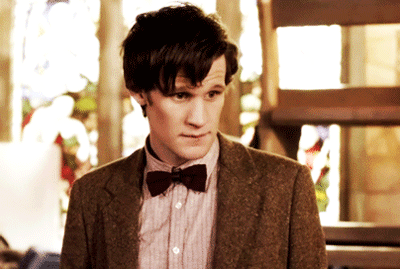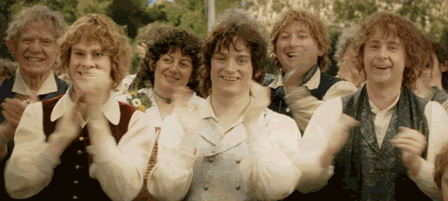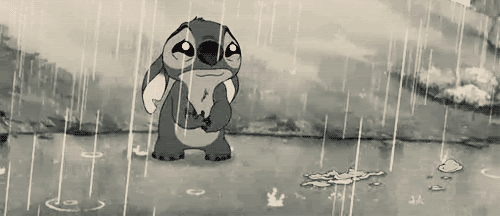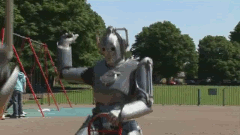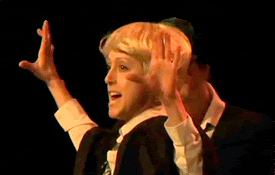Librarian in the TARDIS, Review 4.01
Title: The Android Invasion
Written by: Terry Nation
Team TARDIS: Fourth Doctor, Sarah Jane Smith
Adversary: The Kraals
Originally Aired: November 22-December 13, 1975
Number of Episodes: 4
Synopsis (from TARDIS Wikia) -
The Fourth Doctor and Sarah find themselves in the English village of Devesham near a Space Defence Station. The village seems deserted, the telephones don't work, calendars are stuck on the same date and white-suited figures are wandering about aimlessly. Who are the Kraals and what are their plans for Earth?
My Review:
Title: The Android Invasion
Written by: Terry Nation
Team TARDIS: Fourth Doctor, Sarah Jane Smith
Adversary: The Kraals
Originally Aired: November 22-December 13, 1975
Number of Episodes: 4
Synopsis (from TARDIS Wikia) -
The Fourth Doctor and Sarah find themselves in the English village of Devesham near a Space Defence Station. The village seems deserted, the telephones don't work, calendars are stuck on the same date and white-suited figures are wandering about aimlessly. Who are the Kraals and what are their plans for Earth?
My Review:
How did I not know this was written by Terry ****ing Nation???? Learning new things every day, I guess. But that means that I've reviewed two Terry Nation stories for this project - but none of his Dalek stuff. Let me take a moment to allow myself a bit of a giggle over that.
Okay... giggle over.
Before I started this project, I made up the list of stories I wanted to review. Every time I thought of a story to include for most of the Doctors, this was me:
But when it came time for me to pick stories to review for Tom Baker, this was me:
...because I seriously have no idea what Fourth Doctor stories are the ones that don't get much attention - or undue negative attention. As far as I can tell, anything in which the scarf makes an appearance is treated like the Second Coming (which still doesn't quite explain the fanboy glee over "The Talons of Weng-Chiang," but never mind). Don't get me wrong - I enjoy the Fourth Doctor's stories fairly well. But in my quest to give love and praise to some unloved and unpraised stories, I felt like I'd hit a wall with this era. So, I did what anyone presented with such a problem would do. I brought in the experts, which in this case turned out to be my friends Shaun and Glenn from Traveling the Vortex (I'm sure Keith would have helped too, if he wasn't in the same relative-newbie boat that I'm in). They both gave me great feedback to work with, for which I am very appreciative. And because of their feedback, this section of Librarian in the TARDIS is going to take a slightly different route, but no less interesting and fun (I hope). I am very appreciative of their help and I really hope I do this era justice in their eyes.
When I got their collective lists and I saw that “The Android Invasion” was included, I was floored! Mostly because when I saw this story, I was quite taken with it. I didn't think that it would be lesser-regarded (or maybe it’s just that other stories - “Pyramids of Mars,” “Genesis of the Daleks,” “The Ark in Space” - get more attention). But it’s one that I quite liked. At the time of my first viewing, I really didn't think too much of why I enjoyed it. But on this go-round, where I’m requiring myself to be more critical, I've come up with several reasons:
Sarah Jane Smith: I was really glad that this story was suggested to me because I would not have been happy if I couldn't gush over Sarah Jane at least once during this blogging project. Anything with Sarah Jane is gold. From my first introduction of her in “School Reunion,” I could not help but think “She is a very special lady.” Not just to the Doctor, but to fandom in general. You ever meet someone in person or see someone on TV and immediately like them? Not necessarily because of any special talent or flamboyant nature, but because you think it would be a treat to just sit down and talk with them over lunch? For me, Elisabeth Sladen was one of those people. I never met her, though heaven knows I would have been very honored to do so had I been given the opportunity. And she probably would have been gracious and sweet and humble about it. Now that I've seen more Tom Baker stories, I've come to the conclusion that he was at his very best when Sarah Jane was at his side. He seemed to lose a certain shine when she left (personally, I think the reason “The Deadly Assassin” has no companion in it was because Sarah Jane left an indelible mark and they needed some time to reset things before the Doctor got a new companion).
Something I loved about The Fourth Doctor Revisited special BBC America showed in April was how they highlighted that Sarah Jane was the Doctor’s best friend. I think David Tennant was the one who said that Sarah was the companion who was on equal footing and would do anything for the Doctor. Hell, she saves his life twice in Episode 3! And she's the one who rigs up the electric trap for the guard so she can escape and get the Doctor out of the disorientation chamber (I think that's what that is). While Sarah Jane would do anything for the Doctor, she also doesn't take any of his crap. He teases her, she teases right back. And they're marvelous to watch - they’re almost like a brother-sister relationship. No slight meant against Leela or Romana, but it feels natural and right that Sarah Jane and the Fourth Doctor be together.
Turning UNIT On Its Head: I suppose one reason "The Android Invasion" doesn't fare so well with fans is that it feels like the last, pitiful gasp for UNIT. While that argument is valid, I like to take a different approach here. I feel like there is a distinct desire to do something slightly unexpected with UNIT - not unlike the alternate-universe!UNIT in "Inferno" (which seems to be a fan-favorite - and with good reason). But it's like they wanted to bring that alternate-universe home to the real world - like they brought Pete's World Cybermen through the Void in the new series. So, let’s create a village straight out of “The Twilight Zone” where everyone is an android controlled by an alien invasion force and - just for kicks - we’ll throw in some of the UNIT guys to be androids too! It’s a fascinating concept - especially since the Doctor and Sarah Jane don’t know what’s really going on for the better part of two episodes. But they see their friends and think “Okay - things are going to be okay!” and, nope - they’re really not. Because these guys really aren’t their friends. They’ve just “borrowed” their friends’ likenesses (without permission, I might add).
You Just Crossed Over Into...: I LOVE that the story opens with the mystery of the deserted village and all the strange things that the Doctor and Sarah Jane encounter in the first two episodes (and they don't get properly solved until Episode 3). I'm not as big of an aficionado of The Twilight Zone, but it's something very much fixed in my consciousness (Dad watches the marathons every New Years - I'm still trying to convince him the Doctor Who is right up his alley... not having much luck...) and I can't help but be reminded of the tropes that Rod Serling used to scare the shit out of my parents when they were kids (hell, I get scared by this stuff. Probably why I love the atmosphere of black-and-white Who).
The Kraals: On the surface, these guys look like Sontarans that got left out in the sun too long. And considering all the iconic* villains the Fourth Doctor encounters in his time (Sutekh, Scaroth, Davros, the Wirrn, Morbius, the Zygons, Chancellor Goth, that giant rat in the London sewers - okay, now I’m just poking the fanboy bear), the Kraals could easily get lost in the shuffle. Let’s face it - Four has a ton of one-off villains and it’s hard to keep track of them all. But I like the Kraals. They’re kind of a butt-monkey villain - but they still possess some style. Not the least of which is convincing Crayford that he’s lost his eye and doing it so well that not once does he ever lift up that eyepatch just to look at the scar (I took to calling it the “Hipster Eyepatch” while I was rewatching this - and now that I think of it, maybe it’s a nod to “Inferno.” Sure, we’ll go with that. As is often said on Tumblr: “Headcanon Accepted”).
(Can't resist including a little '70s rock for this next one - yeah, it's a little bit after "The Android Invasion," but it still works)
Playing for Two: I LOVE the android doubles! Anytime a show can get away with having one actor play two parts and those parts be on screen simultaneously is really cool to me. I couldn't begin to tell you why, but I like it. I think I like seeing the range that an actor can pull off. I mean, Harry and Benton's android doubles were trippy enough, but Sarah Jane pull a gun on the Doctor was the world's biggest double-take/whiplash ever! By episode four, you know what's going on with the invasion force and you have to work to keep track what side everyone is on. Which is why the Doctor android getting shot at the end was such a kick in the head - for a moment, you think that the Doctor actually has been shot! But no, the real Doctor reprogrammed the android to act like the real Doctor and that threw everyone - including poor Sarah Jane - for a loop. The trope is used to great effect in this story and that adds to its likability.
All in all, "The Android Invasion" is a wonderful character piece for Sarah Jane and the Doctor. They have to depend on each other in this story - there's no one else they can turn to for help (until Episode 4). The villain is a little goofy, but still enjoyable. The plot is something new and refreshing for Doctor Who (though I wonder if Terry Nation wasn't inspired - at least in part - by Rod Serling at some point. The first two episodes are very reminiscent of "The Twilight Zone"). If you ask me, "The Android Invasion" deserves a spot on the pedestal next to "Pyramids of Mars" and "Genesis of the Daleks" (maybe "Talons" can be convinced to bump down and make a little room).
*I really hate the word "iconic." Can't we come up with another word that means about the same thing?
***
Previously, on Librarian in the TARDIS -
Review 3.03 - The Doctor's Family UNIT
Next Time -
Review 4.02 - This is not cheating! But how can I resist a returning "not-companion"?
Okay... giggle over.
Before I started this project, I made up the list of stories I wanted to review. Every time I thought of a story to include for most of the Doctors, this was me:
But when it came time for me to pick stories to review for Tom Baker, this was me:
...because I seriously have no idea what Fourth Doctor stories are the ones that don't get much attention - or undue negative attention. As far as I can tell, anything in which the scarf makes an appearance is treated like the Second Coming (which still doesn't quite explain the fanboy glee over "The Talons of Weng-Chiang," but never mind). Don't get me wrong - I enjoy the Fourth Doctor's stories fairly well. But in my quest to give love and praise to some unloved and unpraised stories, I felt like I'd hit a wall with this era. So, I did what anyone presented with such a problem would do. I brought in the experts, which in this case turned out to be my friends Shaun and Glenn from Traveling the Vortex (I'm sure Keith would have helped too, if he wasn't in the same relative-newbie boat that I'm in). They both gave me great feedback to work with, for which I am very appreciative. And because of their feedback, this section of Librarian in the TARDIS is going to take a slightly different route, but no less interesting and fun (I hope). I am very appreciative of their help and I really hope I do this era justice in their eyes.
When I got their collective lists and I saw that “The Android Invasion” was included, I was floored! Mostly because when I saw this story, I was quite taken with it. I didn't think that it would be lesser-regarded (or maybe it’s just that other stories - “Pyramids of Mars,” “Genesis of the Daleks,” “The Ark in Space” - get more attention). But it’s one that I quite liked. At the time of my first viewing, I really didn't think too much of why I enjoyed it. But on this go-round, where I’m requiring myself to be more critical, I've come up with several reasons:
Sarah Jane Smith: I was really glad that this story was suggested to me because I would not have been happy if I couldn't gush over Sarah Jane at least once during this blogging project. Anything with Sarah Jane is gold. From my first introduction of her in “School Reunion,” I could not help but think “She is a very special lady.” Not just to the Doctor, but to fandom in general. You ever meet someone in person or see someone on TV and immediately like them? Not necessarily because of any special talent or flamboyant nature, but because you think it would be a treat to just sit down and talk with them over lunch? For me, Elisabeth Sladen was one of those people. I never met her, though heaven knows I would have been very honored to do so had I been given the opportunity. And she probably would have been gracious and sweet and humble about it. Now that I've seen more Tom Baker stories, I've come to the conclusion that he was at his very best when Sarah Jane was at his side. He seemed to lose a certain shine when she left (personally, I think the reason “The Deadly Assassin” has no companion in it was because Sarah Jane left an indelible mark and they needed some time to reset things before the Doctor got a new companion).
Something I loved about The Fourth Doctor Revisited special BBC America showed in April was how they highlighted that Sarah Jane was the Doctor’s best friend. I think David Tennant was the one who said that Sarah was the companion who was on equal footing and would do anything for the Doctor. Hell, she saves his life twice in Episode 3! And she's the one who rigs up the electric trap for the guard so she can escape and get the Doctor out of the disorientation chamber (I think that's what that is). While Sarah Jane would do anything for the Doctor, she also doesn't take any of his crap. He teases her, she teases right back. And they're marvelous to watch - they’re almost like a brother-sister relationship. No slight meant against Leela or Romana, but it feels natural and right that Sarah Jane and the Fourth Doctor be together.
Turning UNIT On Its Head: I suppose one reason "The Android Invasion" doesn't fare so well with fans is that it feels like the last, pitiful gasp for UNIT. While that argument is valid, I like to take a different approach here. I feel like there is a distinct desire to do something slightly unexpected with UNIT - not unlike the alternate-universe!UNIT in "Inferno" (which seems to be a fan-favorite - and with good reason). But it's like they wanted to bring that alternate-universe home to the real world - like they brought Pete's World Cybermen through the Void in the new series. So, let’s create a village straight out of “The Twilight Zone” where everyone is an android controlled by an alien invasion force and - just for kicks - we’ll throw in some of the UNIT guys to be androids too! It’s a fascinating concept - especially since the Doctor and Sarah Jane don’t know what’s really going on for the better part of two episodes. But they see their friends and think “Okay - things are going to be okay!” and, nope - they’re really not. Because these guys really aren’t their friends. They’ve just “borrowed” their friends’ likenesses (without permission, I might add).
You Just Crossed Over Into...: I LOVE that the story opens with the mystery of the deserted village and all the strange things that the Doctor and Sarah Jane encounter in the first two episodes (and they don't get properly solved until Episode 3). I'm not as big of an aficionado of The Twilight Zone, but it's something very much fixed in my consciousness (Dad watches the marathons every New Years - I'm still trying to convince him the Doctor Who is right up his alley... not having much luck...) and I can't help but be reminded of the tropes that Rod Serling used to scare the shit out of my parents when they were kids (hell, I get scared by this stuff. Probably why I love the atmosphere of black-and-white Who).
The Kraals: On the surface, these guys look like Sontarans that got left out in the sun too long. And considering all the iconic* villains the Fourth Doctor encounters in his time (Sutekh, Scaroth, Davros, the Wirrn, Morbius, the Zygons, Chancellor Goth, that giant rat in the London sewers - okay, now I’m just poking the fanboy bear), the Kraals could easily get lost in the shuffle. Let’s face it - Four has a ton of one-off villains and it’s hard to keep track of them all. But I like the Kraals. They’re kind of a butt-monkey villain - but they still possess some style. Not the least of which is convincing Crayford that he’s lost his eye and doing it so well that not once does he ever lift up that eyepatch just to look at the scar (I took to calling it the “Hipster Eyepatch” while I was rewatching this - and now that I think of it, maybe it’s a nod to “Inferno.” Sure, we’ll go with that. As is often said on Tumblr: “Headcanon Accepted”).
(Can't resist including a little '70s rock for this next one - yeah, it's a little bit after "The Android Invasion," but it still works)
Playing for Two: I LOVE the android doubles! Anytime a show can get away with having one actor play two parts and those parts be on screen simultaneously is really cool to me. I couldn't begin to tell you why, but I like it. I think I like seeing the range that an actor can pull off. I mean, Harry and Benton's android doubles were trippy enough, but Sarah Jane pull a gun on the Doctor was the world's biggest double-take/whiplash ever! By episode four, you know what's going on with the invasion force and you have to work to keep track what side everyone is on. Which is why the Doctor android getting shot at the end was such a kick in the head - for a moment, you think that the Doctor actually has been shot! But no, the real Doctor reprogrammed the android to act like the real Doctor and that threw everyone - including poor Sarah Jane - for a loop. The trope is used to great effect in this story and that adds to its likability.
All in all, "The Android Invasion" is a wonderful character piece for Sarah Jane and the Doctor. They have to depend on each other in this story - there's no one else they can turn to for help (until Episode 4). The villain is a little goofy, but still enjoyable. The plot is something new and refreshing for Doctor Who (though I wonder if Terry Nation wasn't inspired - at least in part - by Rod Serling at some point. The first two episodes are very reminiscent of "The Twilight Zone"). If you ask me, "The Android Invasion" deserves a spot on the pedestal next to "Pyramids of Mars" and "Genesis of the Daleks" (maybe "Talons" can be convinced to bump down and make a little room).
*I really hate the word "iconic." Can't we come up with another word that means about the same thing?
***
Previously, on Librarian in the TARDIS -
Review 3.03 - The Doctor's Family UNIT
Next Time -
Review 4.02 - This is not cheating! But how can I resist a returning "not-companion"?


